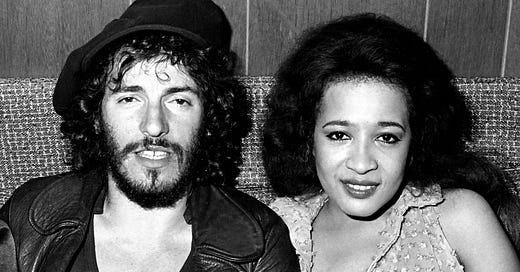Whoa-Oh-Oh: A Farewell to Ronnie Spector
Recalling when I met her in the studio with Springsteen, Steve, Southside, Lee Dorsey and Joe Cocker.
More shocking news tonight: Ronnie passing away at age 78. You can read the obits, the highlights (Phil Spector) and lowlights (Phil Spector) for much more. But nearly everyone who met her seemed to love her and she certainly “seemed nice” in my one encounter with her as described below. And one of our highlights at Crawdaddy in the 1970s was getting already famous novelist Richard Price to interview her for a major piece. Well, it didn’t take much convincing: She was his teenage fantasy up in da Bronx as a kid. Anyway, for starters, here is Ronnie and “Be My Baby” from one of the great movie openings at the very start of Marty Scorsese’s career, from Mean Streets. Then Ronnie live, ending in a “Shout.” Then consider subscribing—it’s still free!
Da-Do-Ron-Ronnie
It was early 1976. Bruce Springsteen’s pal, Southside Johnny, had just signed his own recording contract at Epic Records (with The Asbury Jukes), and since I was pals with both of them I was invited to a Sunday recording session at the Record Plant in NYC that would feature two legends, Ronnie Spector and Lee Dorsey, with “Miami Steve” Van Zandt producing. Joe Cocker happened to be cutting an album in the next studio.
Joe, to say the least, was not at his best.
The scene: A long couch in a corridor between the two studios. I sat down at the far end. Then Cocker and famed session drummer Bernard Purdie joined me, with Joe in the middle. Joe appeared drunk or stoned, his hair a mop. Purdie told him, flatly, “Joe, you’re a mess.” Cocker replied, “I’m all right.”
Purdie: “You’ve been ‘all right’ for years.” One couldn’t help but recall that one of Joe’s earliest hits was “Feelin’ All Right.” Now he needed a little help from his friends. Still in a daze, and perhaps forgetting I was there, Cocker placed a finger on one side of his nose—apparently getting ready to snot lustily out of the nostril facing me. Well, you never saw someone jump off a couch so fast, and I escaped unscathed.
Just another day at the office.
Southside and Steve, who I had first met in December 1972—shortly after my trip to Sing Sing Prison with Bruce and the E Streeters—were a fun pair to interview about the Jukes. Steve claimed they were nothing like the E Streeters. “We have five horns, Bruce only has one,” he boasted. Johnny interjected: “Cause he’s cheap!” Then they reminisced about one of “the 48 bands” they were in with Bruce. In the Sundance Blues Band, Steve played lead guitar “and we only gave Bruce a lick once in awhile,” Johnny said. Steve cracked: “And I don’t think we let him sing one song.”
First they worked on what would become the two most popular cuts on the album, Bruce’s “Fever” and Steve’s “I Don’t Want to Go Home.” Then, a few minutes later, we all had the thrill of watching at close range the elfin Lee Dorsey, just up from New Orleans, croak out a Van Zandt tune, “How Come You Treat Me So Bad?”
Steve, behind the mixing board, screamed at the end, “I think I’m going to die!” Dorsey, the voice behind “Working in a Coal Mine” and “Ride My Pony” and other NOLA classics, told me he hadn’t been in a studio for three years and recently sold his bar in NOLA after getting held up one too many times. Now he was running a body shop with his son—and just the day before had found someone under the hood of one of the cars, trying to swipe a battery.
“Next legend!” Van Zandt ordered, and soon Ronnie Spector waltzed through the door. Still her sassy self, Ronnie (now separated from crazed gun-toting husband Phil) arrived in painted-on jeans, suspenders and a tight red t-shirt. She told me she was coaxed into the studio because the track, “You Mean So Much to Me,” was written by Springsteen. Her recording career at this point was in a kind of limbo, teetering on the edge of obscurity and “whatever-happened-to.”
Bruce was tinkling the ivories when she walked up and gave him a kiss on the cheek. “Nice to see ya,” Bruce responded but, seemingly intimidated, he didn’t say a word to her the rest of the night.
By now, Joe Cocker had staggered down the hall to watch. After a terrific first vocal take by Ronnie, Steve announced, “We still need some woah-oh-ohs at the beginning.” Ronnie replied: “I know whoa-oh-ohs.” An understatement. “Whoa-oh-ohs are my life,” she confirmed. When they recorded the take she threw in a “sock it to me,” sending Springsteen into convulsions.
Watching Ronnie, Steve and Southside huddled in a corner, I asked Bruce, now a star after Born to Run, if he’d ever imagined he’d one day survey this tableau. “Nowadays,” he answered with a chuckle, “I believe anything.”
(A few of my other adventures with The Boss here and here and here.)






Great story. Thanks for sharing.